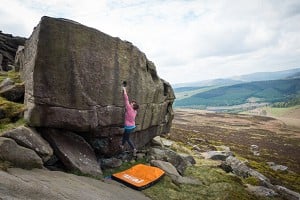
(all pictures courtesy Southern Indoor Bouldering League.)
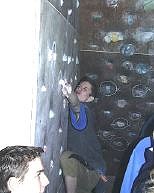
Cold, wet, windy... it's the season for indoor bouldering competitions again, as a quick glance at the news section will show. You know where to go and when, but if you're never entered, or been to a couple and felt disappointed, what's the way to do best? Here's your guide from someone who's been doing it for five years.
If you haven't been to a bouldering competition, here's what to expect: there will be about 20 problems, of increasing difficulty. You will get a few goes (usually three) to complete them. Friends can suggest helpful things like "Grab the hold!"
You'll have a card you take to judges at each problem, and they mark you according to how you do. In the Southern Bouldering league, for example, you get three goes: if you complete the problem first time you get 10 pts; second time, 7pts; third time, 3pts. Some problems have "bonus" holds - reach those and you get an extra point. (They're usually disgustingly hard.)
Now you know that, what's the best way to get the most marks you can?

Before the comp
- Go along intending to do really well
This sounds obvious but you'd be amazed by the number of people who pay £10 or whatever and then don't put their full effort into competing. Afterwards they excuse their low score by saying "Yeah, but I wasn't really trying." The implication being that if they had tried, they would have done great. That's a lie to themselves and everyone else. If you're going to turn up, try to achieve. - View it as a chance to learn how to climb better
Few people win prizes at comps. But it is a chance to see lots of people trying the same problems as you. This can be really educational. Watch what people do: when they fail on problems you can do, is it because their footwork is worse, or do they just try the wrong sequence? When someone succeeds on something you can't quite manage, is it just strength or are they positioning their body better?
Everybody always thinks that people who climb better than them are just stronger. This isn't necessarily true. Often it's about balance, control and technique, not yarding on crimps. - Before the comp, warm up
Sounds obvious, but too many people don't. Stretch your legs, fingers, warm up your shoulders. Do some light bouldering if there's space in the wall. - Have a look at the problems and try to size them up: easy, feasible, hard, impossible
Get some sort of ranking of the problems in your mind so that you don't leap onto something impossible. You'll want to do a couple of easy ones first just to get into the swing of things. You'll want to leave the impossible ones till last.
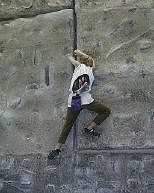
During the comp
- Don't start off with a subtle balance problem
I've seen top climbers make the mistake of beginning on a "one-hand" balance problem (you could only use one hand for holds) and failing first go - thus losing enough points to shift them from 1st place to 3rd at the end of the day. Your body needs to get attuned to how everything is feeling before you can try things like this. - Accept that you will drop some points on a problem you would expect to flash easily
Years of doing comps have shown me that overconfidence comes before a fall. At some point in the day you'll get on a problem you could do any time and fail on it inexplicably - a foot or hand slip or similar. Don't lose your temper; accept it. It happens. But tell yourself too that you aren't going to make that mistake again today. - Watch how other people do problems you're unsure of
If your onsighting skills aren't great, take advantage of the comp's format. Almost all of them let you watch other people doing problems, which means you can scope out the best ways of doing them. Some of the best climbers spend up to half an hour in a comp just walking round watching other people, lining up the order they will do the problems, and then knock them off. - Don't be arsey to the judges; check what the rules of the problem are
If they hadn't turned up then you would probably just be standing there looking at the problems. Judges have to be very patient because they see lots of different people flailing (often) at the same problem again and again. I've seen people lose their rag at judges after being deducted points because they didn't do what the rules said. That's stupid on three counts: first, it makes the judge think you're a git (and so more likely to mark you down); second, it makes the judge think it's not worth dealing with folk like this, so you're going to have one fewer judge at the next comp; and third, if you wanted to know the rules you should have asked the person who knows: the judge. -
A really tough roof problem at Arethusa; the key was body position, not muscle. © SIBL - Some problems are contrived - so what?
Some people have a big mental blocks over sequences which "you wouldn't find outside". Get over it. It's only a game, and you're not outside, and if other people can do it, why can't you? There's nothing sacred about climbing moves. Just be thankful they haven't set an off-width. - Do be nice to the judges - they can help you
They've been standing there all day and have probably seen people succeed on the problem. If they're allowed to, they might tell you the trick to the sequence, if you haven't worked it out already. - If you have to judge, be fair but firm
Some comps have to get competitors to help out on judging. It's tempting to give your mates full marks even if they fell off the first move. But ask yourself: would it annoy you if someone else marked their mates up and then was hard on you? It's as unsatisfying to get the points for something you've done as to aid up a pitch and then claim you flashed it. Find out the rules and apply them fairly. - Don't leave all the hard problems until last
You only have a limited amount of stamina and finger strength. If you leave the ones which are hard but you could do (such as roof or overhanging problems) to the end, then you'll have used up too much energy - you won't be able to do five or ten grim ones. Try to do some hard problems once you're warmed up (perhaps after six or seven earlier ones, in a 25-problem comp) and then save the rest of the hard ones for later.
A really hard problem at Brunel: this needed strength and power and lots of technique. Best left to the end ... © SIBL - Remember Dirty Harry
You must know Magnum Force, the really great one where.... anyway, at the end he comes through all the gunfire and bombs and partners and friends getting topped and closes the film with the line "Man's gotta know his limitations." Know yours too. Those impossible-looking problems? They probably are. Don't waste your energy for no reason. Check what the experts do - if they leave them for later, they're probably very hard. Don't expect to leap four grades in climbing ability just because you're in a competition. Get points on the problems you can score on, rather than the ones you'd like to score on. - Eat and drink sensibly
You will need water. Drink plenty and often. It's a good idea to eat some fruit such as bananas at the start of the comp (the sugars take time to get digested). Choc bars can give a burst of energy.
Afterwards
- Thank the judges and organisers
Without them, what would you have done? They've been nice to you. Return the favour. - Remember, it's not life and death
And if you really really hated it, you could always go climbing (or drinking) the next time.
Charles Arthur has been flailing away, but gradually improving, in the Southern Bouldering League for five years and has the T-shirts to prove it.
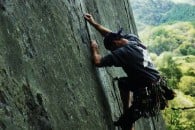

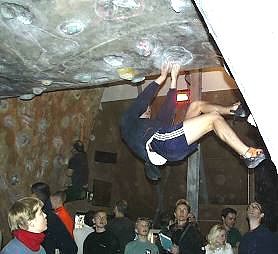
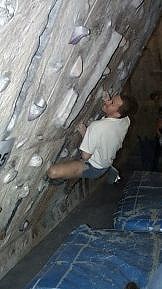
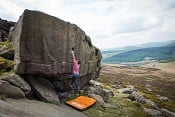

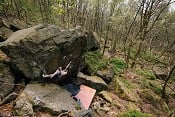










Comments